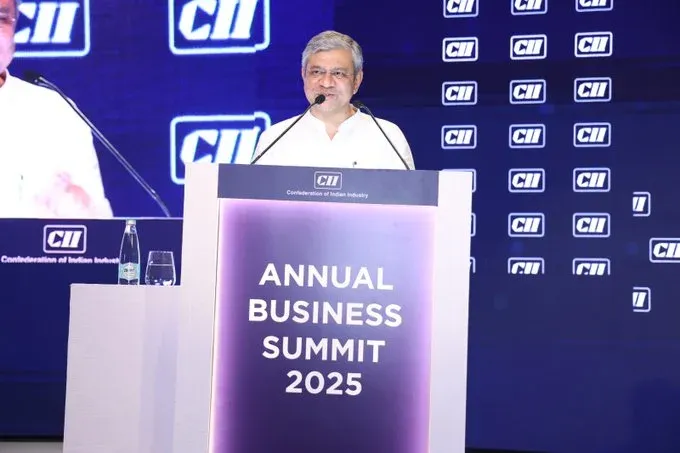Is India Set to Launch Its First 28-90 nm Chip This Year?

Synopsis
Key Takeaways
- First Made in India semiconductor chip to be launched in 2023.
- Focus on domestic manufacturing for technological advancement.
- Significant role of AI in transforming industries.
- Indian Railways achieves global milestones in freight transport.
- New policy encourages startup innovation in the railway sector.
New Delhi, May 29 (NationPress) IT and Electronics Minister Ashwini Vaishnaw announced that the inaugural Made in India semiconductor chip, processing at 28-90 nm, is set to launch this year.
Speaking at the CII's Annual Business Summit, he stated: "We have focused on a specific segment that represents 60% of the market volume, employing a strategic approach."
"Currently, there are six units being built. The first domestically produced chip at 28-90 nm will debut this year as our manufacturing journey commenced in 2022," the minister noted.
In semiconductor production, smaller nanometer (nm) sizes symbolize more condensed transistor designs, permitting manufacturers to integrate more transistors onto a single chip. Chips of 28-90 nm are utilized across sectors such as automotive, telecom, power, and railways.
Highlighting the significance of the manufacturing sector, the minister remarked: "Numerous leading economists advocate for a service-oriented focus. However, both manufacturing and services are crucial for future growth. We must enhance our efforts wherever possible, aiming for our own intellectual property, products, designs, and standards."
He further emphasized the transformative impact of Artificial Intelligence (AI), asserting, "AI is driving substantial change, and its presence is here to stay."
"The impact of AI will parallel that of the internet on a global scale. We must be prepared for this transition, irrespective of industry or sector. AI will catalyze monumental shifts in our society and industries," he stated.
He underlined the necessity of developing AI models rooted in Indian culture, languages, and social norms.
According to the minister, one of the pioneering models is currently in development by Sarvam.
Vaishnaw also reflected on the progress and accomplishments of Indian Railways, for which he is also the minister.
"We have reached a significant achievement, becoming the second largest cargo-carrying railway globally, transporting 1,612 million tonnes of freight, surpassing the US and Russia," he noted.
"Our capacity to carry passengers has also seen remarkable growth. We are achieving dreams and meeting targets. The railways are progressing steadily, and we invite more industries to engage," Vaishnaw added.
The Railway Minister also stated that the initiative to incorporate startups within the railway sector has proven to be highly effective. "We are implementing a new policy that allows for testing innovative ideas followed by scaling up based on the results," he concluded.









